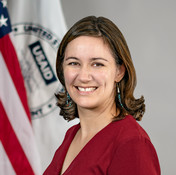Alexandra Vrazo, PhD, MPH

Graduation Year: 2012
Advisor: Longnecker
Current Position: Senior HIV Treatment Advisor, supporting USAID through the Global Health Technical Advisory and Support Contract (GH-TASC) ,
Alex Vrazo entered the Integrated Graduate Program (now known as the DGP) in 2007. She joined the dual degree PhD/MPH program and performed her thesis research in Rich Longnecker’s lab. We caught up with Alex recently to hear more about her journey from an undergraduate in the United Kingdom through to her current position in pediatric and maternal HIV/AIDS programs at the United States Agency for International Development (USAID).
Getting to Northwestern: Alex grew up in Chicago before moving to England, where she earned her undergraduate degree in virology and immunology from the University of Bristol. After gaining lab research experience, she decided to pursue a PhD. Before applying to graduate school, Alex worked at the University of Pennsylvania’s Center for AIDS Research, conducting immune profiling of T cells in persons living with HIV who were enrolled in NIH trials. This experience confirmed her interest in pursuing a PhD focused on immunology and virology. She was drawn to Northwestern, interested by Rich Longnecker's work on Epstein-Barr Virus (EBV), and impressed by the university’s friendly atmosphere and location in Chicago.
At Northwestern: At Northwestern, Alex pursued the PhD/MPH dual degree program, aiming to combine research with public health to impact population health. When these proteins are expressed in B cells, they changed the behavior of the B cells, pushing them into antibody-producing cells or memory cells even in the absence of antigen, possibly as a viral mechanism for promoting long-term cell survival.
As part of her MPH degree, Alex also completed a project with Northwestern Memorial Hospital’s Infection Control Unit. This unit had just begun using a new test for latent tuberculosis infection, the Quantiferon-Gold™ blood test, and Alex’s project was to assess the effectiveness of the test. Her results were used to develop new policies for tuberculosis testing in the hospital.
In addition to her lab and MPH work, Alex was active in a number of student organizations: the Chicago Graduate Student Association, where she served as the student health advocate, and in the Graduate Leadership Council. She says this introduction to advocacy has been very useful in her later career. Alex also earned a Fellowship in Leadership and a certificate from Kellogg in Management for Scientists and Engineers, which she credits for helping build her leadership and management skills.
Beyond Northwestern: Alex completed a postdoctoral fellowship at Cincinnati Children’s Hospital where she studied natural killer cell function. During her postdoc, she volunteered in public and global health settings, including at a mobile syringe exchange, as a reproductive health educator, and as a consultant with a rural Jamaican clinic on a community needs assessment.
Her most significant volunteer global health leadership role was with an NGO doing HIV, health, and economic development work in rural Kenya. Alex worked in progressively more responsible roles, initially on programs, grant applications, and later in a leadership role as Board Chair where she led their strategic plan development.
In 2015, Alex joined the AAAS Science and Technology Policy Fellowship as an Executive Branch Fellow at USAID, working on pediatric and maternal HIV/AIDS through the U.S. President’s Emergency Plan for AIDS Relief (PEPFAR). She has since been promoted to more senior roles, supporting USAID and PEPFAR’s mission to improve health and save lives, focusing on pregnant women, infants, and children living with HIV.
Her responsibilities include managing HIV programs, policies, grants, and contracts in multiple countries across Africa, Asia, and Latin America, while providing technical support. She also collaborates with stakeholders, including US government agencies, NGOs, multilateral organizations, and the private sector to coordinate efforts to improve the health of mothers and children.
Alex enjoys her role’s mission-driven focus, the professionalism of her team, and the impact on mothers and children. She appreciates the fast-paced nature of her job, where priorities shift frequently, keeping the work dynamic and engaging.
Interested in a similar career path? Alex advises that critical thinking, writing, data analysis, perseverance, and flexibility are essential skills learned in a PhD. She also noted that building your network is really important for landing a job.
If you are a dual degree student interested in global health, Alex suggests trying to do your field and culminating experience in a global health environment, if possible. Even if you can’t travel abroad, there are opportunities to work with U.S.-based organizations that do global health work.
If you are not a dual degree student and wish to do global health work, don’t despair! An MPH is not necessarily required, and you can get in-country experience by living and working overseas without needing an MPH. There are a few ways to get that kind of experience, but she recommended considering two: The Global Health Corps, a competitive funded fellowship for those under 30 years of age, and the Peace Corps.
Final pieces of advice from Alex? First, jump on opportunities as they come. Don’t turn down an opportunity just because it’s not perfect; it might not come again. Second, hang in there! Graduate school doesn’t last forever.